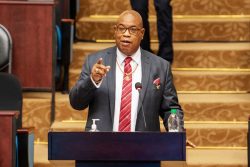Dear Editor,
I note a current public discussion among African Guyanese with two – Messrs Lincoln Lewis and Hamilton Green – asking of another prominent African Guyanese who is former Prime Minister and President Samuel Hinds what he had done to uplift their fellow African Guyanese during his political career.
In the context of a prevailing school of thought, which is supported by some who have access to the media and to shaping public policy, that we are all Guyanese citizens only and should ignore the Guyana Constitution and its guarantee of support and protection for our ethnic, cultural, and religious rights, is this discussion racist? Or is it a most welcomed discourse among members of one of our ethnic communities?
There has been no objection from anyone thus far, so: if an Indian Guyanese were to warn his or her fellow Indian Guyanese to protect themselves during a period of open violence on them, is that racist? Or is it a welcomed and legitimate concern for the safety of fellow members of one of our ethnic communities which should be echoed by every decent citizen?
In his letter to the press that sparked this current exchange, Mr Hinds wrote about the way he saw Indian Guyanese being perceived by fellow African Guyanese as not being fully legitimate citizens of Guyana and who should therefore not be allowed to hold political power. That perception still prevails and has sparked such remarks as uttered by the late UWI Professor Rex Nettleford that “Indians in the Caribbean have to learn to be West Indian”.
Learning to be West Indian would mean erasing or discarding our Indian history and heritage and replacing it with whatever is decided for us by those who see themselves as the “legitimate” citizenry and who, as noted, can speak openly and without fear of being denounced as racist when they use their double-barrelled ethnic and citizenship identity which is their – as well as every other citizen’s – constitutional right.
However, if, say, I were to publicly ask, as an Indian Guyanese, of another Indian Guyanese what he or she has done to uplift our Indian Guyanese community how many denunciations of being racist and divisive would I receive? And, even more interestingly, from whom and from how many quarters?
When will there be an open and honest national discussion on identity and citizenship in this country that will address the prevailing and accepted hypocrisies, double standards, dishonesty, and prejudices that persist against whole groups of Guyanese citizens and which, ironically, continue to further those self-same prejudices and perceptions that Mr Hinds observed decades ago?
Sincerely,
Ryhaan Shah






